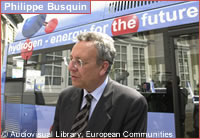Commission to launch high level group on hydrogen and fuel cell technologies
EU Research Commissioner Philippe Busquin has announced the forthcoming launch of a high level group on hydrogen and fuel cell technologies. Hydrogen could be a source of clean energy for the 21st century. It is capable of powering cars and generating plants and of replacing every electricity source, from mobile telephone batteries to bus engines. The group will encourage the development and use of hydrogen and fuel cell technologies and devise a strategy for hydrogen technology at EU level which could lead to a hydrogen industrial platform. The group will include senior representatives from leading European research centres, fuel cell system and component producers, energy companies and utilities, automotive companies and public transport. 'Hydrogen marks a revolution in how energy can be produced and stored,' said Mr Busquin. 'Up until now in the 'fossil fuel civilisation', we have been trying to strike a balance between the need to foster economic growth and at the same time to ensure this has a minimum impact on the environment. 'But Member States and industry cannot bring about this revolution on their own,' the Commissioner continued. 'Efforts are scattered, resources are dispersed, and the costs are extremely high. We need a major effort at EU level to streamline and make different initiatives converge in a consistent way. The high level group will help us achieve this ambitious goal.' Hydrogen can be used directly in combustion processes in the same way as gasoline or natural gas, but fuel cells represent the most promising technology for using hydrogen for power generation. Hydrogen can be obtained from many primary energy sources: by treating fossil or bio-fuels, or by electrolysis of water using electricity generated by renewable energy sources such as solar, wind, wave or tidal power. Hydrogen can therefore bridge the transition from a fossil-based energy economy to one based more on renewable energy sources. Today hydrogen technologies are still expensive and there is no distribution infrastructure similar to the one for fossil fuels. The use of hydrogen as a fuel has up until now been focused on aerospace applications, but fuel cell electric vehicles as well as heat and power systems are now being developed. Engineers are even envisaging hydrogen propelled aircraft, trains and ships. With energy use on the increase, hydrogen technology would also represent a more secure source of energy supply. Transport shows the greatest growth trend in energy end-use with an increase of 16 per cent expected by 2010. Road transport also accounts for nearly one quarter of carbon dioxide emissions. EU hydrogen and fuel cell technology is currently fragmented, reflecting regional or national circumstances. While the total amount of EU funds invested in this field of research is estimated at between 50 and 60 million euro per year, this is one third of what the USA spends, and one quarter of Japanese expenditure. It is hoped that an EU fuel cell and hydrogen technological research strategy will achieve critical mass and improve the effectiveness of EU public support. The group is likely to work with the Commission in the preparation of a strategic research agenda.



